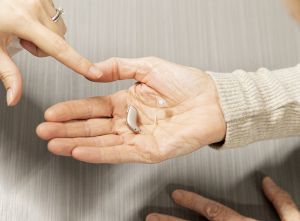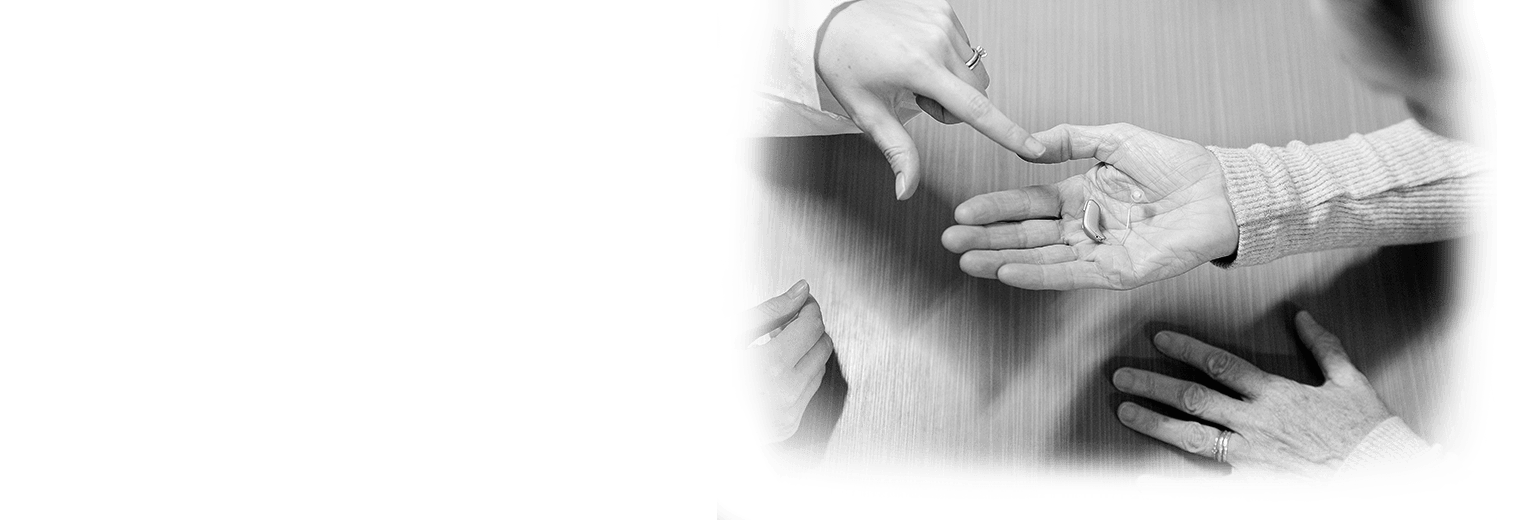|
www.HealthyHearing.com |
Used hearing aids
By Joy Victory, managing editor, Healthy Hearing Last updated on: April 1st, 2025 What to consider before buying or selling used or refurbished hearing aids. Key points:
If you're on a budget, you may be tempted to buy used hearing aids, or to start using a pair gifted to you from a friend or family member. Should I get used hearing aids?In some cases, buying used or refurbished hearing aids can be a great idea. But in many cases, it may be more trouble than it's worth. One of the biggest drawbacks to purchasing used hearing aids is that they were custom-fitted for someone else's ears, not yours. This can be a big problem, particularly for in-the-ear style hearing aids. 
fit someone else's ears, but most can't. In-the-ear style hearing aids will need 're-casing'ITE hearing aids are made specifically to fit an individual’s ear canal. The shape of everyone's ear canal is unique, meaning ITE devices can't be worn by another person unless the custom shell is remade. Not only is this not always possible, but it can also be expensive. Since the lower (or non-existent) cost of used hearing aids is a large part of the appeal, it may be more sensible to buy new hearing aids in this situation. Behind-the-ear styles are more likely to fitBTE hearing aids are one size fits all that sit behind the ear. They are coupled to the ear via custom earmolds or standard ear domes. While someone else's custom earmolds cannot be re-worn, the hearing aids themselves may be reused by someone else. The new wearer would simply need to pair the hearing aids with new custom earmolds or ear tips. Therefore, BTE hearing aids are more likely to be reusable, depending on the technology built into the hearing aids. See a hearing specialist to get the right fitWe recommend seeing a hearing specialist after getting a pair of used hearing aids, so that they can program them to meet your individual needs. Everyone's hearing loss is unique. Hearing aids are carefully programmed and fitted to correctly amplify the specific frequencies a person struggles to hear. You will need to find a provider willing to reprogam your used hearing aids based on the results of your hearing test. Looking for help? Check out our directory of local hearing clinics. Technology level also mattersThe technology found in hearing aids can vary widely. This includes the type of batteries, the programming capability, the age of the processor, whether it has Bluetooth, and how well it’s working. A hearing care professional will need to evaluate the hearing aids to determine whether the technology will work for you. Newer hearing aids often include advanced features like artificial intelligence and come with accompanying smartphone apps, making them more adaptable and user-friendly. Older, used hearing aids are less likely to offer these modern features, which could limit their effectiveness and ease of use. How long do hearing aids last?There's also the issue of natural wear and tear. In general, hearing aids have a lifespan of 3-7 years. Even with good care, over time, internal components like microphones and receivers can degrade, leading to reduced performance. A used device has already undergone part of its expected lifespan, meaning it may fail sooner than a new one. Used hearing devices have many unknownsWhen you buy hearing aids without the help of a hearing care professional, there are no guarantees the hearing aids will work as expected. Additionally, you don't know if they are covered under a warranty for loss or damage. Next steps after buying used hearing aidsIf you have purchased or been given used hearing aids, contact your hearing care professional near you for a complete hearing evaluation. Be sure to bring the hearing aids to the appointment. After quantifying your hearing ability, the practitioner will run electro-acoustic tests to determine the amplification and programming capability of the hearing aids to determine if they might be appropriate for your type of hearing loss.
The second step is to have the hearing aids fully inspected and tested by the hearing care professional to ensure they are still in good working order. If there are concerns, they might need to be sent to the manufacturer for reconditioning or repair. After the hearing aids are approved for your use, find out whether they are covered under any existing manufacturer warranty. If they aren't, consider whether you might want to purchase an extended hearing aid warranty to cover any loss or damage. Finally, once the hearing aids are determined to be ready for you to wear, the practitioner will need to program them specifically for your hearing ability. Like any other hearing aid fitting, this programming may require more than one session to fine-tune the hearing aids to your specific hearing, preferences and lifestyle needs. Be prepared to pay for the services that you need to get your used hearing aid fitted for you. Although you may have received the hearing aids themselves for free, you should expect to pay the professional for a testing and/or fitting fee, as well as any fees for reconditioning or repair that may be needed. Can I sell my hearing aids?Yes, refurbished hearing aids are legal to buy and sell, although you must follow the rules stipulated by federal and state laws. This can get complicated. At a minimum, the hearing aids must come with packaging that clearly indicates they are being resold. Be cautious and do your research before embarking on selling your hearing aids. Desert Valley Audiology in Las Vegas recommends going a step further and adding "all the relevant information a buyer would want to know: the manufacturer and model number, the unit’s age and condition, warranty type, the type of battery it takes, and your reason for selling it." As they point out, you can also keep your old hearing aids as backup. "This is not a bad idea, in the same way that keeping your old pair of glasses as a backup is a good idea when you get a new pair," they explain on their page. Can I donate used hearing aids?Yes! If the hearing aid won’t work for you, it might work for someone else, and many people find them unaffordable otherwise. One of the best things you can do with used hearing aids—whether they're in great condition or need repairs—is to donate them to a charity that will accept used hearing aids to be re-purposed, reprogrammed or recycled to assist others in need in both the U.S. and around the world. Places like the Hearing Aid Project and other organizations accept donated hearing aids and help provide hearing care to everyone who needs it. Want to learn more? Check out: What to do with old hearing aids (including donation info) Put your hearing health firstWhether you choose new or used hearing aids, the most important thing is prioritizing your hearing health. Hearing aids improve communication, benefit your health, and help you stay connected to the world around you. If you're struggling to hear, don’t wait—schedule an appointment with a hearing specialist today. The right solution can make all the difference in your quality of life. Joy Victory, managing editor, Healthy Hearing
You are reading about: Related topics
More information about hearing loss, hearing aid brands, assistive devices and tinnitus. Featured clinics near me
Earzlink Hearing Care - Reynoldsburg Find a clinicWe have more hearing clinic reviews than any other site! Related contentThe Healthy Hearing Report |
|
www.HealthyHearing.com |
Used hearing aids
By Joy Victory, managing editor, Healthy Hearing Last updated on: April 1st, 2025 What to consider before buying or selling used or refurbished hearing aids. |



 Joy Victory has extensive experience editing consumer health information. Her training in particular has focused on how to best communicate evidence-based medical guidelines and clinical trial results to the public. She strives to make health content accurate, accessible and engaging to the public.
Joy Victory has extensive experience editing consumer health information. Her training in particular has focused on how to best communicate evidence-based medical guidelines and clinical trial results to the public. She strives to make health content accurate, accessible and engaging to the public.